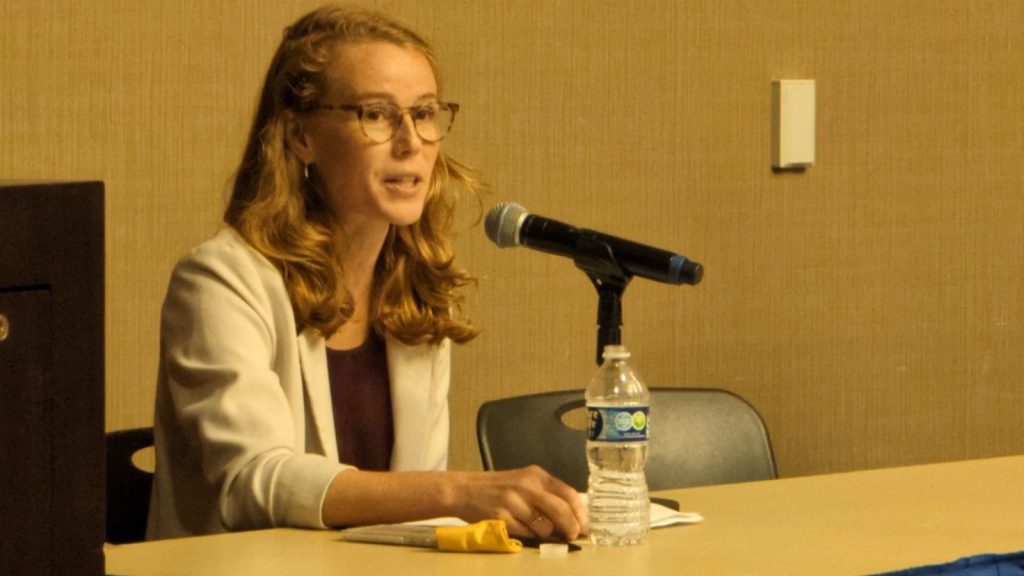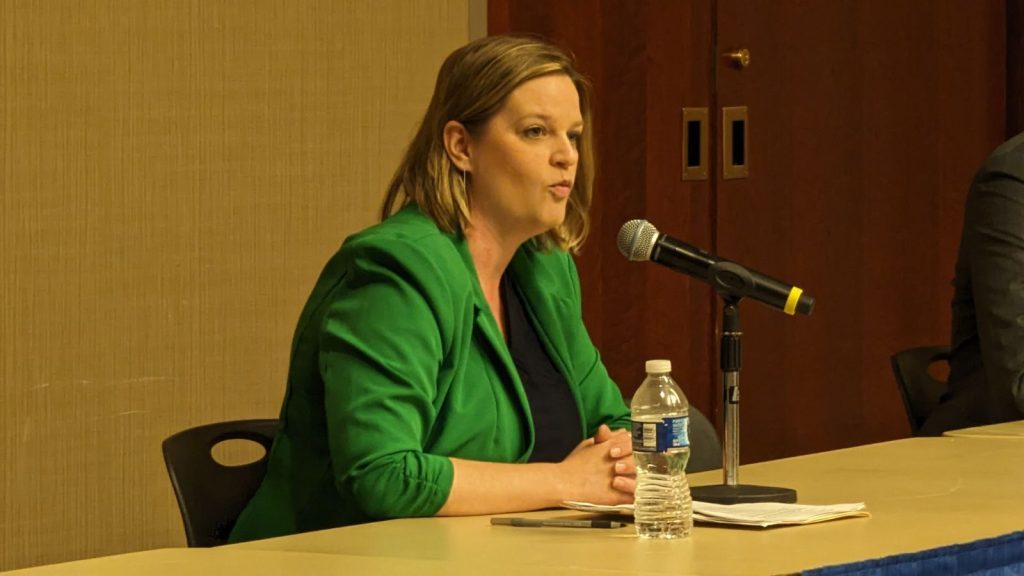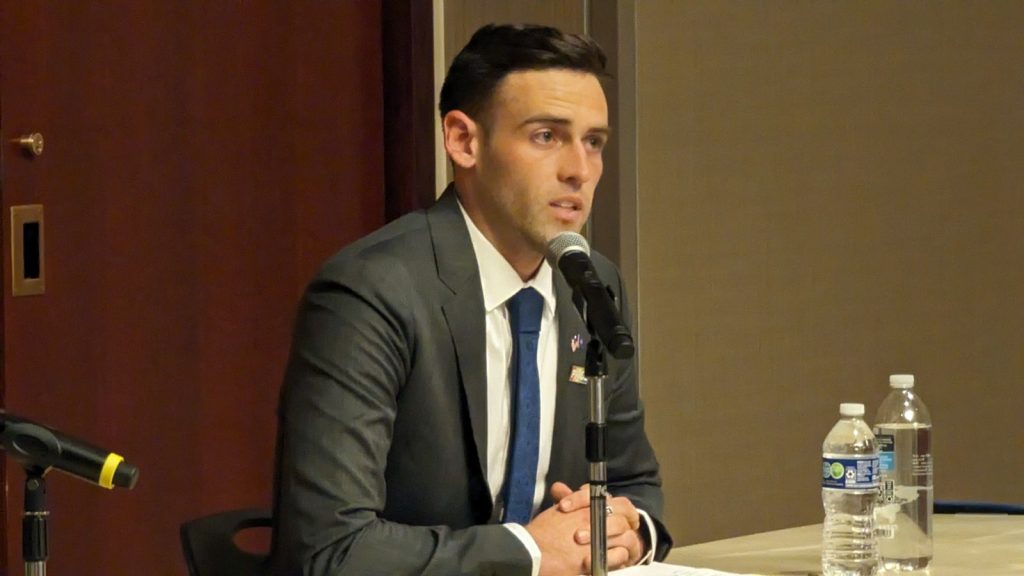
Source: All photos courtesy of each candidate's respective campaign
3rd Congressional District Democratic Primary preview
Wisconsin's Partisan Primary is being held on August 13.
WESTERN WISCONSIN (Civic Media) – Wisconsin’s 3rd Congressional District is drawing attention like few other districts in the nation are.
That’s because the western Wisconsin district is considered one of the most hotly-contested seats of any in the House of Representatives.
Republican Derrick Van Orden of Prairie du Chien won the spot in Congress with 51.82% of the vote in 2022, defeating Democratic state Sen. Brad Pfaff of Onalaska. The win was one of several in the country that was under a 5% margin.
Candidates challenging Van Orden this year include Assembly Rep. Katrina Shankland, former Congressional candidate Rebecca Cooke, and Eric Wilson, a real estate professional in Eau Claire. The winner of the August 13 primary will face Van Orden in the November General Election.
History of the 3rd Congressional District
The 3rd Congressional District has had a half-century of going back and forth between Republicans and Democrats. Before Van Orden, the 3rd District was represented by Democrat Ron Kind, who was first elected in 1997. He was proceeded by Republican Steve Gunderson, who served in Congress from 1981 to 1997.
Alvin Baldus, who was in office from 1975 to 1981, was the first Democrat to hold the district since 1909. However, the district as it is currently configured – covering most of western Wisconsin from roughly the St. Croix River valley down to the Illinois state line – didn’t really take shape until 1960. Since then, it has usually included cities like La Crosse, Eau Claire, River Falls, Platteville, and Menomonie.
Today’s configuration also includes a part of central Wisconsin, including the city of Stevens Point. That gives the 3rd Congressional District a footprint that includes six of the 13 Universities of Wisconsin four-year campuses.
Who’s running for Congress?
The trio of candidates on the Democratic primary ticket are Rebecca Cooke, Katrina Shankland, and Eric Wilson. The winner on August 13 will face Republican incumbent Derrick Van Orden. Here’s a look at each Democratic candidate, listed in alphabetical order by last name.
Rebecca Cooke

Cooke, who ran unsuccessfully for the Democratic nomination in 2022 to face Van Orden, is a former small business owner and nonprofit leader in Eau Claire County. She’s also worked on other Democratic candidates’ campaigns and highlights her current job in hospitality in campaign messaging.
Cooke’s platform focuses on health care, agriculture, and typically-Democratic subjects like clean energy and public education. Cooke touts her upbringing on a dairy farm as a reason she is motivated to work on agricultural issues.
Like other candidates, Cooke has repeatedly said during her campaign that her top priority is defeating Van Orden in the General Election.
In a statement on Aug. 1, Cooke said that taking on Van Orden is “an all hands on deck effort.”
Katrina Shankland

Shankland, a member of the state Assembly since 2013, is a former nonprofit professional, according to her legislative biography. The Stevens Point Democrat has been productive in the legislature, serving on five committees. Shankland says on her campaign website that she has co-authored or co-sponsored 225 bills that have become law.
On her platform, Shankland lists reproductive freedom first among the issues she is campaigning on. She also supports adequate funding for public education, strengthening labor unions and support for small businesses, and investing in agriculture.
During the campaign, Shankland has made a point of highlighting her experience as the only candidate in the primary that has held public office or won an election against Republicans.
Shankland has publicly lamented extremism in politics and writes on her campaign materials that she can work on bipartisan solutions to issues.
Eric Wilson

Wilson brings a different perspective to the primary race. While all three candidates generally support typically Democrat-led legislative ideas, Wilson supports more progressive initiatives, such as the Green New Deal. He also highlights his experience as a working professional in areas like real estate for perspective on other issues that voters are considering.
Wilson’s priority issues include supporting Medicare for All, unrestricted access to abortion, bans on assault weapons, and student loan forgiveness. Wilson also said during candidate forums that he’s the only one running that is calling for a ceasefire in Gaza.
At nearly every turn, Wilson labels himself as the most progressive choice on the ballot and a clear contrast to policies supported by Republicans.
Wilson said he’s the only candidate supporting ideas like Medicare for All and responsible gun ownership in the primary.
Democratic forums: A chance to hear candidates speak
Wisconsin’s 3rd Congressional District Democratic Party held informational forums across the district this spring and summer. The four events offered candidates time to speak on issues submitted by party members and voters, as well as meet some of the people in the district.
The first forum was held in Stevens Point at the end of April, which served as an introduction of sorts to the Democratic primary field.
[podcast src="https://civicmedia.us/shows/special-broadcasts/2024/04/25/3rd-congressional-district-candidate-forum-1-of-4"]One week later, in early May, a forum was held in La Crosse, where the three candidates spoke more to their policies and plan of action if they were elected to Congress.
[podcast src="https://civicmedia.us/shows/special-broadcasts/2024/05/02/3rd-congressional-district-candidate-forum-2-of-4"]In June, the trio headed to far southwestern Wisconsin, holding a forum in Platteville. The third forum stayed away from heavier subjects like health care and gun control, instead picking subjects in direct contrast to Republican policy.
[podcast src="https://civicmedia.us/shows/special-broadcasts/2024/06/12/240612-3rdcd-candidate-forum"]The final forum was held in mid-July, which turned back to top-of-platform topics like health care, reproductive rights, and the economy.
[podcast src="https://civicmedia.us/shows/special-broadcasts/2024/07/17/3rd-congressional-district-candidate-forum-4-of-4"]Each forum was an hour and a half long, with a total of six hours of run time for all four forums.
Cooke leads in fundraising…
According to Federal Election Commission data that was updated at the beginning of August, covering the campaigns through July 24, Rebecca Cooke had a healthy lead over fellow Democrats Katrina Shankland and Eric Wilson in fundraising.
Cooke has raised $2,007,509.37 so far, with $590,562.86 cash on hand. That’s nearly double the amount raised so far by Shankland ($867,511.52) and Wilson ($181,669.51), and nearly triple the amount of cash on hand ($189,660.70 for Shankland and $29,274.51 for Wilson).
By comparison, Republican incumbent Derrick Van Orden has raised $4,779, 789.84, with $2,468,369.63 cash on hand, dwarfing his three Democratic challengers combined.
…but the source of funds is a hot topic leading into the primary
The source of campaign contributions has changed the tenor of the Democratic primary, with Shankland and Cooke trading statements over so-called “dark money” going into Cooke’s campaign.
On Aug. 1, Shankland, Congressman Mark Pocan, and state Sen. Jeff Smith took Cooke to task for accepting super PAC money to run ads attacking Shankland’s legislative record, something Shankland said affects all Democrats in the legislature, not just her campaign.
Cooke’s campaign released a statement after the press conference, saying she “would work with anyone” to defeat Van Orden. The campaign also issued a release that criticized Shankland’s voting record, particularly on health care, and labeled one of Shankland’s video ads in July as an attack ad.
In return, Shankland said in the press conference that attack ads funded by out-of-state political action committees are disappointing.
“In a Democratic primary, to ask an out-of-state, dark money group to go negative against another Democrat, that is the key here,” Shankland said. “That’s something we haven’t seen before in Wisconsin, at least not something I’ve not seen.”
Wisconsin Gov. Tony Evers spokesperson Britt Cudaback defended Shankland’s voting record and said the attack ads “aim to mislead” voters in a post made on X on Aug. 1.
The negative turn in the primary has resulted in no scheduled public debate ahead of Aug. 13.
The source of campaign fundraising continues to be a top issue as each candidate works to secure the Democratic spot on the General Election ballot.
The August Primary is on the 13th
In addition to choosing their preferred candidate to run in the state’s 3rd Congressional District, all voters will be asked on Aug. 13 to consider a pair of state constitutional amendments that would transfer the power of distributing federal funding from the governor to the state legislature.
The statewide referendums are written and supported by Republicans and opposed by Democrats.
You can see your voter registration information, status, or where you can register to vote, see sample ballots, and see who your current elected officials, and the length of their terms, on MyVote Wisconsin’s website.
For more information about Wisconsin elections, you can visit the Wisconsin Elections Commission website.

Jimmie is Civic Media’s Sports Director who also works in digital content, sports, news, and talk programming. Email him at jimmie.kaska@civicmedia.us.
Want More Local News?
Civic Media
Civic Media Inc.
The Civic Media App
Put us in your pocket.
